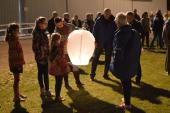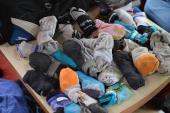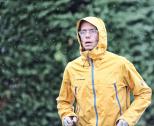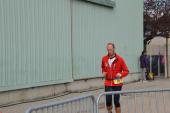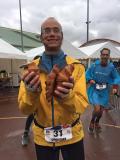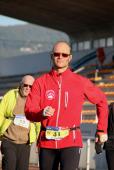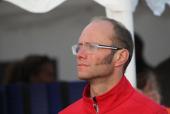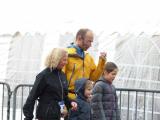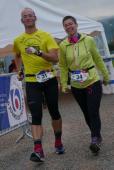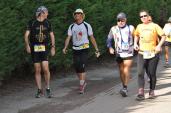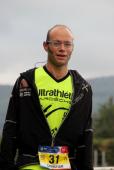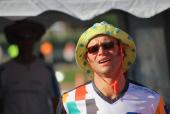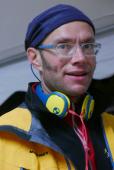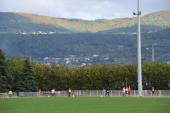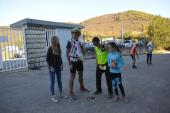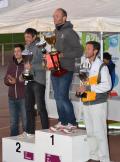6 x 6
Ah... six days. I think it's the type of race I like best. For just only one single week of vacation, a simple registration, one has a unique occasion to pile up many miles, and it's a permanently renewed pleasure. This will be my sixth, after:
- 2010, Antibes, 504 miles
- 2013, Le Luc, 438 miles
- 2014, Privas, 441 miles (racewalking)
- 2014, Phoenix, 541 miles
- 2015, Johannesbourg, 502 miles
This time, I'm back with my whole family, including Valérie who will, for the first time, race the 6 days, instead of crewing me.
We invested quite a bit into logistics. Valérie's mother and our three daughters sleep in a little house we rent in Privas, downtown. And we also rent a camping-car that stays near the track, for both of us racers. Because, you know, camping in a tent in October, can be a success story. It can also become a complete disaster if the weather gets wet and cold.
Both the house and the camping-car have been found through Leboncoin, of course.
Putting all the pieces together
It's hard for me to write this race report in a linear way, telling a story that goes from day 1 to day 6. I have strong images and memories from this unforgettable week. But they are all mixed up, and it gets confusing when I try to figure out what happened first.
3 days of rain, 3 dry days
The weather was quite simple: rain for 3 days, then no more rain. Period. At least it was not raining all the time during the first part, so it could have technically been worse. But then it was bad enough so that the race director decided to reduce the loop length from 0.63 miles to 0.37 miles (40% shorter) because all the inner part of the loop was filled with water. It was a short loop, but still not as short as the one in South Africa, so I was already used to that.
At some point, we even had a good shower, that kind of sudden intense rain that pushes all the runners into the various hides around the track. Restrooms, any kind of primitive shelter, and of course tents around the refreshment are soon filled with all those that were previously circling around. Well, not exactly all of them. We were, I'd say, half a dozen to keep going. Then the others came back. Even if there was water everywhere and your shoes would get wet. Because if they had waited until it was dry, that would have meant a long, long, very long wait. I think I got quite an edge during that period, so many people stopped that I mechanically got ahead of the pack.
During the second part of the week, the weather was significantly better. Rather dry, with no rain at all for vast periods, and even some clear blue sky. As a consequence, nights were colder. Some did suffer from it, not having the right equipment. This is easy for me to say, as I had a camping-car with all the required comfort at hand. But still. In 2014 it was cold too, and I was in a tent and at that time already, I had handled the cold better than the average just... because I had the right gear. I keep on repeating that presumably Norwegian proverb that says "there's no such thing as bad weather, only inadequate equipment".
Indeed, I have a hell of a stock pile of warm clothes, thin or thick, windproof, waterproof, I might not have enough items to dress up in new dry clothes every day, but almost. Those nights are funny, I would typically divide them in three parts. First, from 8 pm to 11 pm, it's dark, fresh, but everything's fine. Then, from midnight to 5 am, it gets colder, but it's rather stable. And somewhere around 5 am, it gets even colder, and what's more the morning humidity makes everything damp and freezes you to death. Again, not as cold as those Phoenix nights at "Across the Years", and I've known colder conditions at the Raid 28.
So well, that's the point, the weather isn't so great. I think, like everybody, I lost some little time, but not as much as with extreme heat I think. I imagine the days it was raining it did cost me more time to take care of my feet, and generally speaking dressing up was an important subject so mechanically, it did slow me. Not mentionning several layers of wet clothes... is something you must carry along the path! But in the end, this might represent only 5 or 10 "lost" miles, not much more.
Come as you are
It's funny to observe each runner's style. When walking it's not that true, walkers walk, they don't stop, and paces do not vary that much. But running, there's a wide range of possible speeds and attitudes among which one can pick one's own style.
For instance, Jean-Louis Vidal always run with a dynamic stride, rather fast, and is almost always bended forward. It's really easy to recognize him.
Patrick Malandain, running fast too, stands straight comparatively, probably not as dynamic, but very seldom walks.
Michele Notarangelo passes by, from time to time, like an UFO, at a nervous pace, openly chasing someone on the track. The rest of the time, you would not notice him.
Olivier Chaigne, can't beat that guy, with a very short and fast stride, amazingly efficient, and his unique resting posture, with his hands on his hips and elbows pointing behind him.
Louis Fouquet, with a typical long-distance runner stride, a very efficient walk (there, it's useful to be tall and have long legs...)
Yvonnick Simon, the lost trailer, I recognize him mostly with his out-of-norm body frame (tall and strong). I mean, when playing rugby you definitely want Yvonnick on your side, wearing the colors of your beloved team.
Jean-Claude Beaumel, slightly bent on his side, but not too exagerated. And always, always, moving.
William Sichel, the profesionnal stride, you see him doing his stuff and think "oh yeah, right, this is how it should be done, I should take a look and do the same..."
And the unforgettable Jérôme Chevrieux, using those 6 days as a training ground (at least, that's what it looks like...) and you see him pass everyone, from time to time, at a litterally blazing speed, only to disappear a few hours afterwards.
And all the others. It's somewhat complicated to explain and write down all these facts. But I do think among the 170 starters, I might be able to recognize a 100 of them, just with their running style. After spending so much time together, we tend to know, and appreciate, each other.
It's kind of hard to really tell wether, between all these styles, there's a final and definitive "better option".
Tactics
This is no big news, I enjoy switching between walking and running. This time, my plan was: half an hour walk, then an hour and a half running. With 2 jours sleep per night, except the first night with only half an hour, and the last night being rated as "I see what I do when I'm there". And I also authorized mysself to take 15 minutes nap when I would feel "zombified". And that's it.
I often hear people on the track saying "oh right, Christian, so you have yet again one of those very well prepared plan and all?". Err... No. I mean, the above paragraph is the plan, all the plan, there's nothing else, it fits within 3 or 5 lines. I never understood and think I never will, those plans which go like "100 miles on day one, the 80 on day 2, 75 on day 3, ...". No kidding, if you do 80 miles on day 2, but have 4 extra hours ahead of you, and feel great, are you seriously going to sleep 4 hours more "just because I'm too fast"? Doesn't make sense.
It's the practical on-the-field reality that defines your moving speed, your mileage. The only thing you can act upon is the demand (faster, slower, for a longer time...) but the final pace is the consequence of so many factors, especially when the weather is tricky, that it's wiser, in my opinion, not to care too much about it.
This is just my 2c opinion.
Love
So Valérie was here. She handled it very well. This was not the most simple 6 days. She had a target of 315 miles (500k). She started rather well, did a good job, then got a quite worrying injury - sufficiently bad that she would spend some time at the hospital for safety checking - which did reduce her mileage.
She still managed to get back on track, after a good night sleep. It's always to try and rewrite history afterwards, and the next day, she was feeling great and thought "oh dear, I should have pushed it harder!". But it's more complicated than that. If you never stop, injuries never get fixed... they get worse... and you suffer even more... My small 6 days wisdom tends to have me thinking that you can never go through it by ignoring pain and neglecting those "details".
I was super happy to see her on the track. There are by the way a lot of couples on the race. We, but also the Chevillon, Wepierre, Burger, Debaisieux, Calou & Didier, and I'm probably forgetting some.
Music
Once again, I did listen quite a fair amount of music during the race, especially at night. Only at night, to be true. When it's daylight, it's of no real use, and I prefer opening myself to the outer world, meet the other runners. The French running federation does forbid MP3 & earphones on races. If this is for security, I fail to see how we're concerned on 6 days. At 3 am alone on a closed track, what's wrong with it ?
But the most important thing is, I mean, I cannot forget to mention this unbelievable Karaoké. I discovered unsuspected talents. I even - and this is rare - switched off my own music to fully enjoy this unexpected experience, just for a few laps, with totally unique interpretations of Johnny Haliday, Mike Brant, and others. It's complicated to explain, you had to be there to get the thing, but this was intense, and it shed a ray of light to my otherwise exhausting evening.
Mailbox
During a 6 days, a top-notch messaging system is set up, relaying messages that are submitted by online supporters. Basically, you fill up a form on Internet, then the race organization prints all these on paper and distributes them in physical mailboxes available just on the side of the track, so you only have to pick up a sheet of paper once or twice a day, and "voilà!".
These messages are an incredible positive support. More precisely, I receive a lot of them from my new colleagues at DataDog.
What I do not know yet, is that they have set up a real dashboard which enables them to follow me online, and it's streamed, live, in our Paris and New-York offices.
This is absolutely amazing, and it works very well, it displays the very exact nifo you need: average speed for the last hour, how many laps between me and the next runner. The right thing.
Getting cranky
If you look at it from far enough, you could consider that basically, I took the lead on Monday, and managed to keep it for the rest of the race. Period.
Reality is a little more complex.
On Monday, I've had chaffing problems. I mean, serious problems. Basically, all the sensible parts between my legs was ruined. I won't detail this as this is not something easy to talk about, but it was about having "the wrong underwear with the wrong shorts + permanent moisture because of the weather = it's all red and swelling, and it f*cking hurts". I had to find a solution. I manage to do something with adhesive band and cream (thanks to Anne who saved my life by jumping to the drugstore and getting me some "Mytosil"). Meanwhile, I had to run like a duck and walk like a cow-boy. And then it was over.
Later on the race, I had my right Achille tendon worrying me. It's sort of common with me. This one is a little fragile. I should sue my parents. I mean, a tendon that starts whining after 300 miles, I could attack them protesting that this ain't solid enough and there's a manufacturing problem, right? At the very first signs of the problem, I go and see Wil, the race doctor. He confirms the problem exissts, and I should be cautious. So on his advice I put ice on it. Then I eat dinner sitting on a chair, at a table, which is something I normally don't do, I would eat while walking. To complete the icing process, the night just after, I deliberately run in shorts, even if it's dead cold, so that my leg, including the calf and tendon, are kept cold. Call this "free, natural icing". It does not feel comfortable, but it might be efficient, you know. And then I wonder why it did hurt in the first place. Could it be the chip? Those chips are nice, you can barely feel the strap on your ankle. But "barely" and "not at all" is not the same. I put the chip on the other leg.
Curiously, the next day, I have pain in my *left* lower leg. Now this must stop, the chip migratesto my wrist. I want my ankles to be totally free. And then I cut the upper part of my socks. I had never done this before, and just after doing it, was wondering why I waited for so long before trying it... It feels so much better! Someday they are going to listen to some ultrarunner feedback and make socks that are already cut at day zero, when you get them from the shop. Until then, cut them. On a marathon, this is of no use at all. On a multiday, no kidding, it's a must.
Manage your lead
I quite soon had a "comfortable lead". I never planned to "just maintain in first position", adapting my speed to the second guy's pace. As a proof of what I'm saying, in South Africa, I was about 150 miles ahead of the second man, this is not what I'd call "doing the bare minimum". I usually simply try to pile up as many miles as possible. Always.
But it happens there was always someone to try and catch up on me. Faces changed. Louis Fouquet stayed quite a long time in second position, then sadly, he got injured an was reduced to a walk. So it's Jean-Louis Vidal who took after. From my "observation tower" I could also spot the amazing come-back of Olivier Chaigne. He had problems at the very beginning of the race (and this is sad both for him and for the fun of the race...) so he ended up in the middle of the pack but on day 3 he got "fixed" so with a lot of power and freshness. Olivier, you usually don't want him on your heels, before he can very soon get in front of you. He stabilized about 30 miles behind me. At this distance it's still quite complicated to fire and attack, the time it would take you to "come back" you're usually exhausted...
Only Jean-Louis was pretty much in the same case. He did a very slow start - for reasons I don't fully understand, apparently it's simply about being new to the 6 days format - so he was quite strong at the end.
Jean-Louis really helped me a lot, it was motivating to have this runner, who runs very well (dynamic stride, running for real...) and who probably belongs to a category well above mine (amazing fast marathon time around 2:30 when he was younger...), it was motivating to have him chasing me. It helped me to stay awake when I was tired in the middle of night.
6 days, especially at the end, is about having guts, but also some basic tactic skills. More precisely, the last night is important, with a tricky question that sums up to "should I sleep or should I keep going". When you are ahead, you have the lead, and you pretty much decide. I think I remember that when I when to bed on the last night, I had a 20 miles lead. You could reasonnably expect someone to move at a 4 mph average at that stage. You stop two hour, you loose 8 miles. Only 12 miles left. Then as the other sees you stop, he might experience a sudden speed-up, realizing he can pass you. So moving faster, the advance could fall down to, say, 9 miles. And 9 miles is not something unbreakable. But still, 20 miles is quite a lot. So I slept. 30 minutes. This means 50 minutes not moving, with changing socks and all.
Only 30 minutes because it was enough. My guess: should the weather have been nice and warm, I could have gone through this night without any sleep, thanks to the fat 2 hours I had every night before (2 hours = at least a complete sleep cycle). But as it's cold, I thought I would need the extra energy provided by this small sleep.
One last tactic move: with all these cold and wet nights, walking was a pain, I could feel my body temperature lowering with time. This is how I countered this: stop walking, run all the time. So for about 8 hours, I gave up with my usual pattern of 30 minutes walk, and hour and a half running, and simply ran every lap. Of course I ran at a slow pace, but in the end I think it was a good choice. I wasn't that cold on this last night. And for Jean-Louis, it was really complicated to catch me, unless I was doing a big blunder or got injured, there was simply no way to catch me. I think at some time, he would have needed to finish a 100k in 11 hours. Which, at this stage of the race, doesn't sound very likely to happen.
Finish him
The end was very hard.
Basically, all the story was pre-written at dawn. I was going to win, with little over 800k, maybe even 500 miles. Only, this is just paperwork, I still had to do it, and had over 30 miles to go. And, what's more, I was plain exhausted.
I remember telling myself "oh, strange, in 2014, we did not finish here" before I realized how stupid that thought was (it's a closed track, we never move, the place is always the same...)
With sunrise, all the participants who slept during the night were out and running in all directions. At least it seemed. This looked like a final sprint. So I threw my last forces in the battle. Only to realize there's still 7 hours to go. At about 10 or 11 am, a good deal of all that running crowd is back in the tent, camping-car, whatever, for a little rest. And I'm alone there, walking like the dumb guy I am. I do not run that much any more. My right Achille tendon clearly reminds me that I'm not unbreakable. The lower left leg too, is falling apart. Knees as well. OK, I'm done. Should I have a guy to catch 2 laps ahead, or someone chasing me, I could technically push the machine and take risk to blow up something, but this really does not sound reasonnable, at a few hours of the very end. Hang on.
And I found this atrociously, unbelievably, awfully long. The least attempt to speed up would end up by some new random pain warning me things could turn up bad. This is when you're happy you've learnt how to walk. It proves very valuable.
A good surprise
The good surprise is to win with "only" 507 miles. Because there were some quite good runners at Privas this year, I think. And I was worried about the consequences of the Transpy which, without any doubt, did leave some "traces" of fatigue on my body. So I was hoping for a top five, but the first place was not something I could count on. But you can never count on this anyway. And, aside of my final mileage and position, a 6 days is always a hell of an adventure, a deep dive in a strange world filled with exotic and attractive fish. Would I jump into it again in 2017? Certainly!
And BTW, if this race report is not enough, just read Valérie's race-report (in French).
PS: and many thanks to Agnès for all the great pictures she took of the event. Thanks, really.
